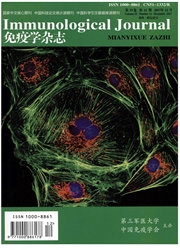

 中文摘要:
中文摘要:
果蝇肠道上皮细胞是机体抵抗微生物入侵的第一道防线。双重氧化酶(dual oxidase,DUOX)产生的活性氧(reactiveoxygen species,ROS)与核转录因子NF-κB(nuclear factor kappa-light-chain-enhancer of activated B cells)信号通路产生的抗菌肽(antibacterial peptide,AMP)为肠道提供了广谱抗菌作用。同时,肠道上皮细胞采用多种精确复杂的负调控机制来调节DUOX-ROS与NF-κB-AMP免疫系统,实现对共生菌群的免疫耐受。此外,肠道干细胞能通过增殖与分化来修复由感染引起的肠道损伤。本文对NF-κB信号通路、ROS的免疫调节机制及肠道干细胞分化机制进行了综述。
 英文摘要:
英文摘要:
The gut epithelia are the first line of defense against pathogens.Under infectious conditions,dual oxidase(DOUX)-dependent reactive oxygen species(ROS) and NF-κB(Nuclear factor kappa-light-chain-enhancer of activated B cells) dependent antibacterial peptide(AMP) provide a wide spectrum of microbicidal activity for the gut of Drosophila.To gain the tolerance to commensal bacteria,gut epithelia are equipped various negative regulatory mechanism for the DUOX-ROS and NF-κB-AMP systems.In addition,intestinal stem cell(ISCs) can repair gut damage caused by infection through proliferation and differentiation.The following review demonstrates the regulatory mechanisms of NF-κB pathway,DUOX activity and expression,and intestinal stem cell proliferation in the gut epithelia of Drosophila.
 同期刊论文项目
同期刊论文项目
 同项目期刊论文
同项目期刊论文
 期刊信息
期刊信息
